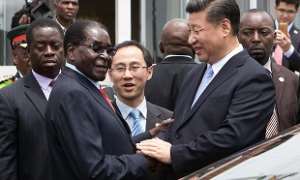
Like the fall of the Berlin wall in 1989, distinguishing the flames of communism, colonialism and Apartheid also faded after the Europeans lost its grip on Africa when demanding of political independence swept through Africa colony in the fifties.
Even though Africa is much underestimated, the continent’s rich mineral resources always attract both developing and developed countries. China is now actively engaged in Africa, but under heavy criticism, because the West and America see them as opportunists interested in Africa’s resources.
Nearly 600 years ago, the first Chinese reached Africa during the Ming dynasty, a period of cultural restoration and expansion, on the coast of Kenya. The next significant arrival was in the early 1900's when about 60,000 Chinese miners worked on goldfields in South Africa.
Later, Chairman Mao Zedong sent tens of thousands of agricultural and construction workers to Africa to enhance ties with countries emerging from colonialism.
Africa, taken as a continent of ignorance, attract Europeans and Asians because many believe that without enough education, Africa is a place one can easily set up a business and be a boss.
The weak economy, influenced by rampant corruption, has allowed African leaders quickly welcoming Chinese business entrepreneurs to Africa. The Chinese have taken over the construction works in Africa, employing hundreds of Chinese and African nationals, becoming the most aggressive investor-nation in Africa.
Although China is playing a significant role in the construction and engineering sectors in Africa, not everything that glitters is gold. Chinese companies are cutting into Africa’s profits.
Most African companies are losing jobs to the Chinese companies because a lot of the African leaders have confidence in them and also they offer lower construction prices.
Nevertheless; trade between China and Africa reached a new high last year, totaling US$198.5 billion. It is estimated that about 1 million Chinese people are engaged in different sectors in Africa.
The strong presence of Chinese in Africa have sparked controversy, as America and Europe continue to accuse them of flooding the market with inferior or cheap quality products. Due to the rate of poverty, Africans rely on affordable products.
It seems they have found solution and satisfaction in Chinese products. To build a good relationship with African leaders China continues to support and giving a loan to Africa to enhance its developments.
In Ghana, a crackdown on illegal miners exploiting the gold industry led to the deportation of thousands of Chinese nationals from the country.
The immigration authorities say more than 4,500 Chinese nationals were repatriated after a series of swoops on illegal goldmines; souring the relationship between the governments of Ghana and China.
Many Ghanaians and local residents aren’t happy over the action of the Ghanaian government. “They were the ones that provided the mining equipment, most of the Ghanaians left behind can’t continue their operations,” said one of the local residents, but many Ghanaians concerned about health and environmental hazards lauded the government’s efforts to curb illegal mining.
The question is: Why years after colonialism Africa still depend on foreign aid, despite economic growth in many parts of the continent significantly outpacing the global average?’
How is the money spent and how can Africa progress without foreign aid? What is the significance of independence when Africa is still crawling like a baby learning how to move around?
Science and technology provide the transformation of every developing and developed country, in this way, Africa has to build expertise in these areas for the economy to take off, but since corruption has affected every infrastructure, the continent has a long way to go and will always lack behind in development.




 Dumsor: Mathew Opoku Prempeh has been disrespectful, he should be fired – IES
Dumsor: Mathew Opoku Prempeh has been disrespectful, he should be fired – IES
 NPP prioritizing politics over power crisis solution — PR Strategist
NPP prioritizing politics over power crisis solution — PR Strategist
 E/R: Gory accidents kills 3 persons at Aseseaso, several others critically injur...
E/R: Gory accidents kills 3 persons at Aseseaso, several others critically injur...
 Nobody can come up with 'dumsor' timetable except Energy Minister – Osafo-Maafo
Nobody can come up with 'dumsor' timetable except Energy Minister – Osafo-Maafo
 Dumsor: You ‘the men’ find it difficult to draw timetable when ‘incompetent’ NDC...
Dumsor: You ‘the men’ find it difficult to draw timetable when ‘incompetent’ NDC...
 We’re working to restore supply after heavy rains caused outages in parts of Gre...
We’re working to restore supply after heavy rains caused outages in parts of Gre...
 NPP government plans to expand rail network to every region — Peter Amewu
NPP government plans to expand rail network to every region — Peter Amewu
 Dumsor must stop vigil part 2: We’ll choose how we demonstrate and who to partne...
Dumsor must stop vigil part 2: We’ll choose how we demonstrate and who to partne...
 2024 elections: NDC stands on the side of morality, truth; NPP isn't an option —...
2024 elections: NDC stands on the side of morality, truth; NPP isn't an option —...
 Akufo-Addo has moved Ghana from 'Beyond Aid' to ‘Beyond Borrowing’ — Haruna Idri...
Akufo-Addo has moved Ghana from 'Beyond Aid' to ‘Beyond Borrowing’ — Haruna Idri...
